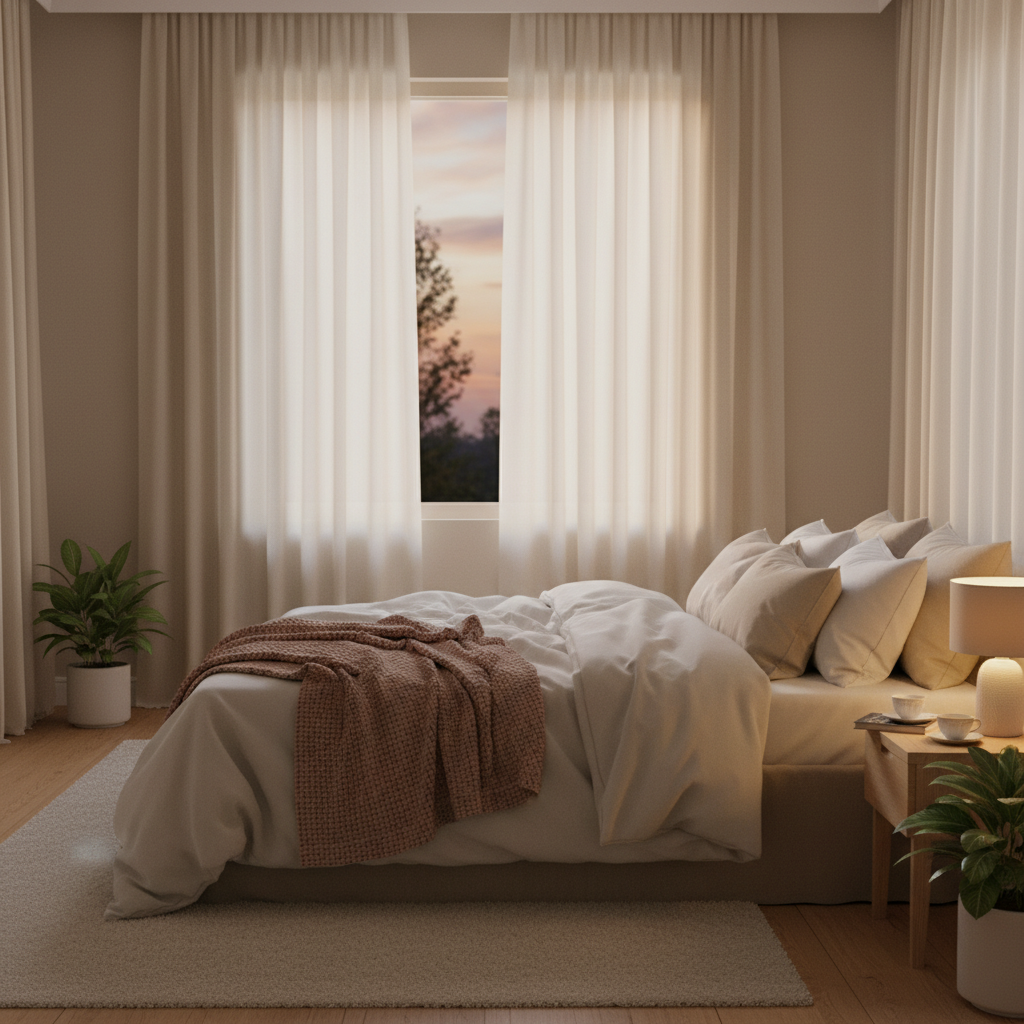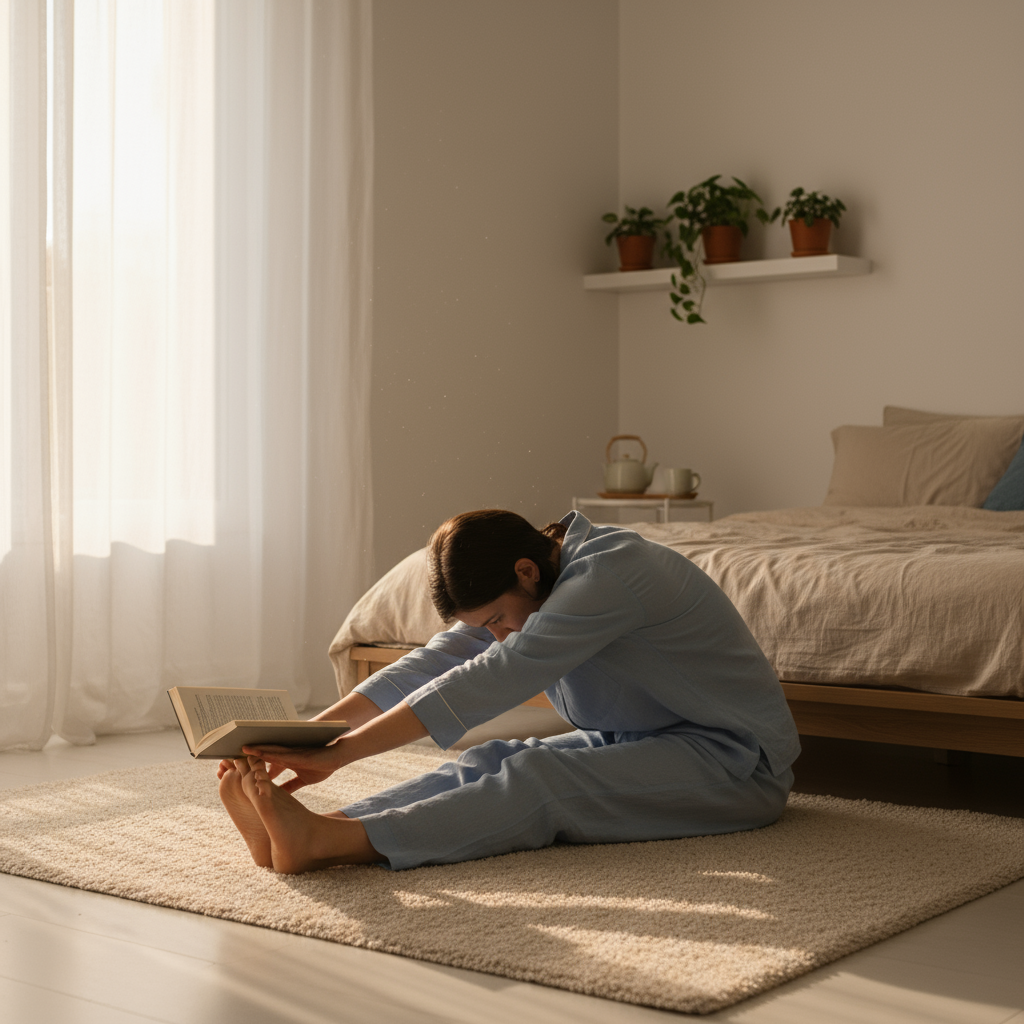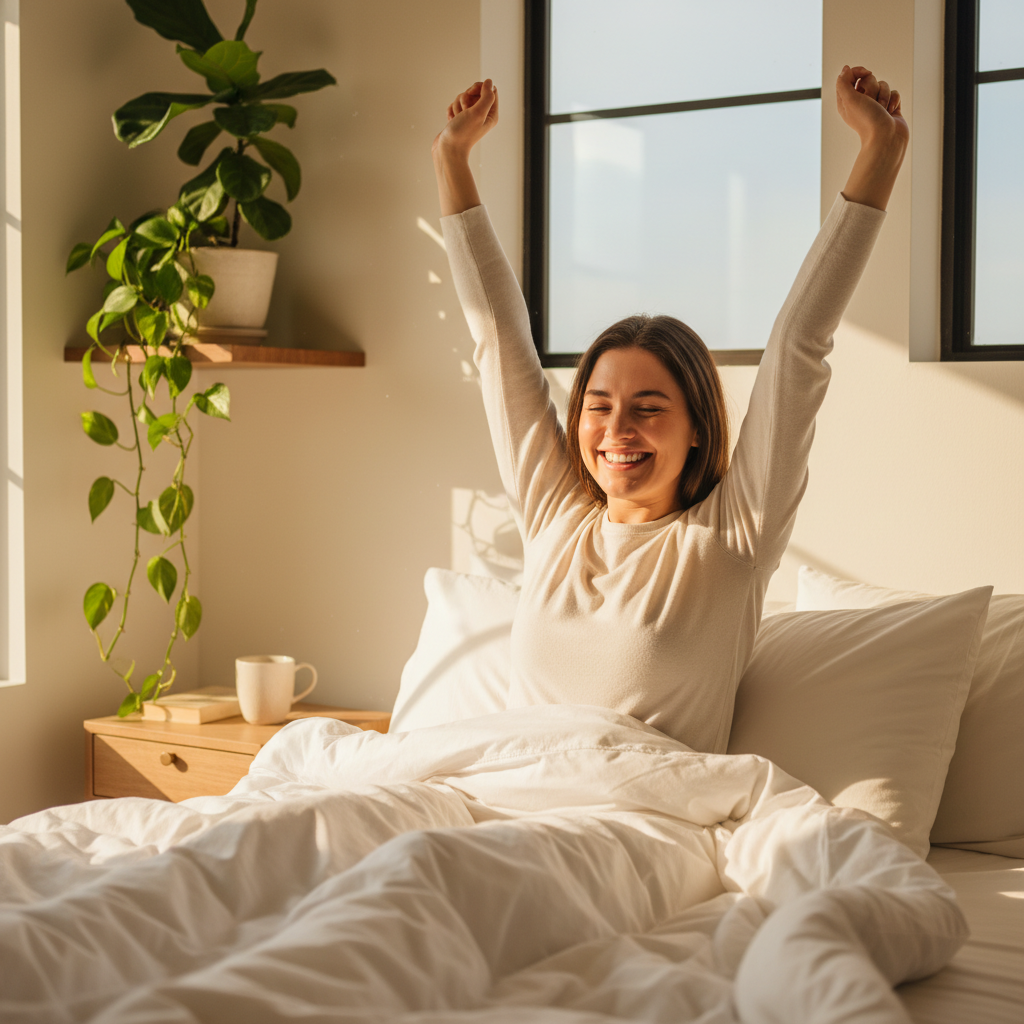
Table of Contents
Introduction
Have you ever found yourself tossing and turning at night, staring at the ceiling, longing for restorative sleep? Trust me, you’re not alone. Millions of us struggle with this exact same thing every single night. But here’s what I want you to imagine: waking up refreshed, energized, and ready to tackle whatever the day throws at you. Sounds pretty amazing, right? Well, that dream doesn’t have to stay a dream—this guide will help make it your new reality.
Here’s the thing about quality sleep: it touches absolutely everything in your life. Your brain function, emotional balance, immune system, even how your body processes food—it all depends on getting good rest. Yet so many of us are walking around like zombies because we can’t seem to crack the sleep code. The culprits? They’re everywhere. Chronic pain that won’t quit, sleep apnea that steals your breath, too much scrolling before bed, that extra cup of coffee at 3 PM, noisy neighbors, streetlights blazing through your window. Sound familiar? The reasons we can’t sleep are as varied as we are, but understanding them is your first step toward finally getting the deep, restorative sleep your body is practically begging for.
Most sleep problems start with the basics—and that’s actually good news because it means you have more control than you think. Simple things like going to bed at the same time every night, creating a wind-down routine that actually works, and turning your bedroom into a sleep sanctuary can make a world of difference. If you’re just starting out or want to fine-tune what you’re already doing, checking out healthy sleep habits will give you practical steps that actually stick. And let’s talk about stress for a second—because when your mind is racing at bedtime, good luck falling asleep. Learning some solid effective stress reduction methods can be a game-changer, not just for sleep but for your sanity too.
Now, about that phone glued to your hand… We live in a screen-obsessed world, and those blue light rays are messing with your sleep more than you realize. They’re basically telling your brain “Hey, it’s daytime!” when you’re trying to wind down. Learning how to reduce screen time can help you find a healthier balance that actually lets your brain know when it’s time to sleep. But here’s where it gets interesting—fixing your sleep isn’t just about what you do before bed. What you eat, how much you move, and how you handle stress during the day all play starring roles in how well you sleep at night.
What You’ll Learn in This Guide
I’m going to walk you through everything you need to know to finally get the sleep you deserve. We’ll dig into why you’re not sleeping well and give you actionable strategies you can start using tonight. By the end, you’ll have your own personalized sleep improvement plan that fits your real life.
- Common Causes of Poor Sleep: We’ll explore the physical stuff (like medical conditions), lifestyle habits that backfire, and environmental factors that are sabotaging your rest.
- Proven Tips for Better Sleep: You’ll discover practical ways to build routines that work, create the perfect sleep environment, and improve your sleep hygiene for deeper, uninterrupted rest.
- Lifestyle Changes That Support Sleep: Learn how what you eat, how you move, managing stress, and practicing relaxation can completely transform your sleep patterns.
- When to Seek Professional Help: Know the warning signs that mean it’s time to talk to a doctor and how to get the help you need for serious sleep disorders.
As we go through all this together, you’ll start to see how small changes can lead to huge improvements. We’ll also talk about something really important: the connection between your mental health and sleep. They’re like best friends—when one improves, the other follows. Getting serious about how to improve sleep hygiene from a mental wellness perspective can speed up your progress toward actually sleeping through the night.
Food matters too—probably more than you think. The right nutrients help your body’s natural sleep-wake cycle do its thing properly. Understanding the balanced diet benefits can guide you toward eating choices that support better sleep. Plus, staying active (in the right way) can tire out your body in all the best ways. These fitness tips for weight loss aren’t just about dropping pounds—they’re about building energy during the day so you can actually rest at night.
Want to take your nutrition game up a notch? Exploring plant-based protein sources can introduce you to foods that support both your health goals and better sleep. When you combine smart eating with less screen time, better stress management, and consistent routines, you’re basically creating the perfect storm for amazing sleep.
We’ll also cover the nitty-gritty details of creating your ideal sleep space. Think lighting that doesn’t mess with your melatonin, sound levels that won’t jolt you awake, the right temperature (spoiler: cooler is better), and bedding that actually makes you want to crawl into bed. Plus, I’ll help you figure out when it’s time to wave the white flag and get professional help—because sometimes you need backup, and that’s totally okay.
Look, better sleep is absolutely within your reach. It’s not about perfection; it’s about making informed choices and building habits that work for your life. Ready to stop counting sheep and start actually sleeping? Let’s figure this out together.

We’ve all been there—staring at the ceiling at 2 AM, wondering why sleep feels so elusive. Good sleep isn’t just nice to have; it’s absolutely essential for your health and well-being. But here’s the thing: when sleep goes wrong, there’s usually a reason (or several reasons) behind it. Understanding what’s messing with your sleep can be a game-changer. Once you know what you’re dealing with, you can actually do something about it. We’re going to dig into the most common sleep saboteurs and, more importantly, share some tried-and-true strategies to help you reclaim your nights.
Common Causes of Poor Sleep
Sleep can be surprisingly fragile. It doesn’t take much to throw off what should be a natural, restorative process. Medical issues often play a bigger role than people realize—things like chronic pain, sleep apnea, or restless leg syndrome can turn what should be peaceful rest into a frustrating battle. These aren’t just minor inconveniences; they can seriously mess with your ability to fall asleep and stay asleep. And if left untreated? They tend to get worse, leaving you exhausted and foggy during the day. If you’re curious about how your body naturally wants to sleep, check out these healthy sleep habits that work with your natural rhythms instead of against them.
But it’s not just medical stuff. Your daily habits and mental state can be just as disruptive. Stress and anxiety are notorious sleep thieves. So is that afternoon coffee that seemed like a good idea at 3 PM, or those late-night scrolling sessions on your phone. Here’s something most people don’t realize: the blue light from screens actually tricks your brain into thinking it’s daytime, suppressing melatonin—the hormone that helps you feel sleepy. No wonder you’re wired when you should be winding down! Making some adjustments to your daily routine can help, and incorporating effective stress reduction methods can tackle one of the biggest sleep disruptors head-on.
Key Aspects of Common Causes of Poor Sleep
Let’s break down what might be keeping you up at night:
- Physical and Medical Conditions: Sleep apnea doesn’t just cause snoring—it actually stops your breathing repeatedly throughout the night, fragmenting your sleep so badly that you wake up feeling like you never slept at all. Restless leg syndrome creates this irresistible urge to move your legs just when you’re trying to drift off. These conditions need professional attention because they’re not going away on their own.
- Lifestyle Habits: That late-day coffee? It can stay in your system for 6-8 hours, keeping you alert long past bedtime. And those evening Netflix binges aren’t doing you any favors—the blue light suppresses melatonin production right when your body should be ramping it up. Stress and anxiety spike cortisol levels, which is basically like having your body’s alarm system stuck in the “on” position.
- Environmental Influences: Your bedroom environment matters more than you might think. Outside noise, light creeping in, temperatures that are too hot or cold, even an uncomfortable mattress—they all chip away at your sleep quality. Your bedroom should be your sleep sanctuary, not a source of additional stress.
- Psychological Factors: Mental health challenges like depression or chronic stress don’t just affect your mood—they actually change your sleep architecture. They can prevent you from reaching those deeper, more restorative sleep stages that your brain and body desperately need.
The reality is that poor sleep often has multiple causes working together. That’s why addressing just one factor might help, but tackling several at once usually gives you the best shot at getting the quality sleep you deserve.
Tips for Improving Sleep Quality
Now for the good news—once you know what’s causing your sleep troubles, you can actually do something about it. One of the most powerful (and underrated) strategies is keeping a consistent sleep schedule. Going to bed and waking up at the same time every day—yes, even on weekends—helps regulate your internal clock. Your body loves predictability, and when it knows what to expect, falling asleep becomes much easier. If you’re struggling with time management and consistency, these time management skills can help you build routines that actually stick.
Creating a wind-down routine is another game-changer. Think of it as giving your brain and body a gentle heads-up that sleep time is approaching. Maybe it’s reading a few pages of a book, doing some light stretching, or practicing a bit of mindfulness. The key is consistency and avoiding anything stimulating. And about those screens—try to put them away at least an hour before bed. I know, I know, easier said than done. But if you’re serious about better sleep, learning strategies to reduce screen time in the evening can make a noticeable difference in how quickly you fall asleep.
Key Strategies to Improve Sleep Quality
Here are the strategies that actually work:
- Consistent Sleep Schedule: Pick a bedtime and wake time that work for your life, then stick to them religiously. Your circadian rhythm will thank you by making sleep feel more natural and leaving you less groggy during the day. It might take a few weeks to see the full benefits, but it’s worth the patience.
- Relaxing Pre-Bedtime Routine: Develop a 30-60 minute routine that signals to your body it’s time to sleep. Reading, gentle stretching, meditation, or even a warm bath can work wonders. The key is avoiding anything that gets your heart racing or your mind spinning—save the action movies and work emails for earlier in the day.
- Optimized Sleep Environment: Your bedroom should be cool (around 65-68°F), dark, and quiet. Blackout curtains, eye masks, earplugs, or a white noise machine—whatever it takes to create your ideal sleep environment. Don’t underestimate how much difference a comfortable mattress and pillows can make either.
- Lifestyle Adjustments: Regular exercise can dramatically improve sleep quality, but timing matters—finish vigorous workouts at least 3-4 hours before bedtime. Watch your caffeine intake (that 2 PM coffee might still be affecting you at 10 PM), and while alcohol might make you feel sleepy initially, it actually disrupts your sleep cycles later in the night.
The goal isn’t just to sleep longer—it’s to sleep better. Quality trumps quantity every time. When you start combining these strategies and tailoring them to your specific situation, you’ll likely notice improvements not just in how you sleep, but in how you feel and function during the day. Sweet dreams!

Here’s the truth about sleep problems: they rarely have just one cause. You might be dealing with medical issues like sleep apnea or chronic pain, lifestyle habits that work against you (hello, late-night coffee!), or an environment that’s just not sleep-friendly. Maybe it’s too bright, too noisy, or your mattress feels like a medieval torture device. These factors love to team up against you, which is why you need a game plan that tackles multiple angles. The good news? Once you start recognizing these patterns, you can actually do something about them.
Let’s talk practical stuff that actually works. Your sleep schedule matters more than you think—yes, even on weekends. When you go to bed and wake up at roughly the same time every day, your body’s internal clock starts cooperating instead of fighting you. Build yourself a wind-down routine that signals “time to sleep” to your brain. Keep your bedroom cool, dark, and quiet (blackout curtains are your friend here). And don’t forget the basics: what you eat, how much you move, and how you handle stress all play huge roles in whether you’ll actually get quality rest.
Sometimes, though, you need backup. If you’re lying awake night after night, dragging yourself through days feeling exhausted, or dealing with symptoms that scream “sleep disorder,” it’s time to call in the professionals. There’s no shame in getting help—in fact, catching these issues early can save you years of poor sleep and the health problems that come with it. Your doctor can help identify underlying conditions that might be sabotaging your rest.
Ready to turn this knowledge into actual better sleep? Start simple: pick consistent sleep and wake times, then build a relaxing routine that works for your lifestyle. Our comprehensive guide on healthy sleep habits breaks down practical strategies that can completely transform your nights. If stress is keeping you wired when you should be winding down, check out our resource on stress reduction methods. And here’s something crucial—that blue light from your phone or laptop is messing with your sleep more than you realize. Learn how to break free from the screen trap with our guide on how to reduce screen time. For the complete picture on creating an optimal sleep environment, dive into our dedicated guide on how to improve sleep hygiene.
Want to take a more holistic approach? Good thinking. Sleep and stress are connected in ways that might surprise you. Our guide to stress management techniques can help you tackle both issues at once, setting you up for better sleep and overall well-being.
Look, better sleep isn’t going to happen overnight (I know, I know—the irony). It’s more like building a habit than flipping a switch. But when you combine smart lifestyle changes with the right information and professional help when you need it, you’re setting yourself up to reclaim the restorative sleep your body craves. Be patient with yourself, stay consistent, and use every tool available to build a sleep routine that actually works. That energy and vitality you’re missing? It’s coming back.
Keep pushing forward with your sleep improvement journey. The more you learn about optimizing your sleep environment and habits, the better your nights will become. Sweet dreams are definitely within reach.
Frequently Asked Questions
-
How much sleep do adults need?
- Most adults need 7-9 hours of sleep per night for optimal health.
-
Is it bad to use electronics before bed?
- Yes, blue light can disrupt melatonin production and delay sleep onset.
-
Can exercise improve my sleep?
- Regular physical activity can promote deeper, more restful sleep, but avoid intense exercise close to bedtime.
-
What should I do if I have trouble falling asleep frequently?
- Consider improving sleep hygiene and consulting a healthcare provider if problems persist.
-
Are naps helpful or harmful?
- Short naps can be beneficial, but long or late naps may interfere with nighttime sleep.
